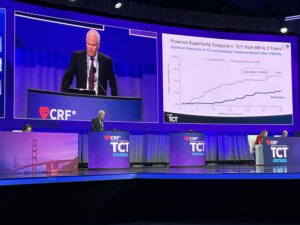
Latest clinical results for the DynamX coronary bioadaptor (Elixir Medical) demonstrate that the device achieved a 48% reduction in target lesion failure (TLF)—encompassing reductions in cardiac death, target vessel myocardial infarction, and ischemia-driven target lesion revascularisation—from six months through two years in prespecified landmark superiority analysis.
David Erlinge (Lund University, Lund, Sweden) presented the latest findings from the INFINITY SWEDEHEART trial at the 2025 Transcatheter Cardiovascular Therapeutics (TCT) conference (25–28 October, San Francisco, USA).
The device is implanted in a similar fashion to a drug-eluting stent (DES) but begins “unlocking” after it is encapsulated with tissue and its absorbable polymer coating is resorbed. This is intended to allow the vessel to grow and adapt to maintain established blood flow lumen.
INFINITY- SWEDEHEART set out to evaluate the safety and efficacy of the bioadaptor compared to the DES in a population representative of every day clinical practice, including a large proportion of acute coronary syndrome (ACS) patients, from 20 sites across Sweden.
The trial enrolled 2,400 patients (aged between 18 and 85 years) requiring PCI who had previously untreated chronic coronary syndrome (CCS) or ACS and had achieved a successful target vessel pre-dilation. Patients were randomised in a 1:1 ratio to either bioadaptor (1,201 patients; average age 68 years; 24% female) or DES (1,198 patients; average age 68 years; 24% female).
Additional findings indicate a significant reduction in target vessel failure (TVF) from six months through two years in prespecified landmark analysis, alongside a substantial clinical benefit for patients with acute coronary syndrome (ACS) from six months through two years in prespecified landmark analysis.
“The INFINITY-SWEDEHEART long-term landmark results confirm our trial design hypothesis, demonstrating separation of the event curves for TLF at six months and maintaining consistency up to two years with a reduction of TLF by 48%. Our data validates the unique property of the bioadaptor of restoring coronary physiology after unlocking after half a year, which translates into improved clinical outcomes long-term,” said Erlinge.











